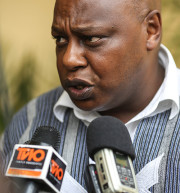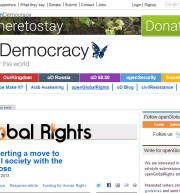
GENEVA – A group of United Nations human rights experts* today urged the Government of Ethiopia to stop misusing anti-terrorism legislation to curb freedoms of expression and association in the country, amid reports that people continue to be detained arbitrarily. The experts' call comes on the eve of the consideration by Ethiopia of a series of recommendations made earlier this year by members of the Human Rights Council in a process known as the Universal Periodic Review and which applies equally to all 193 UN Members States. These recommendations are aimed at improving the protection and promotion of human rights in the country, including in the context of counter-terrorism measures. “Two years after we first raised the alarm, we are still receiving numerous reports on how the anti-terrorism law is being used to target journalists, bloggers, human rights defenders and opposition politicians in Ethiopia,” the experts said. “Torture and inhuman treatment in detention are gross violations of fundamental human rights.” “Confronting terrorism is important, but it has to be done in adherence to international human rights to be effective,” the independent experts stressed. “Anti-terrorism provisions need to be clearly defined in Ethiopian criminal law, and they must not be... Continue reading →

BUJUMBURA, Burundi –UN Special Rapporteur Maina Kiai will give a public lecture in Bujumbura, Burundi, tomorrow as part of a brief academic visit to the country ahead of key elections planned for 2015. The lecture will take place at 2 p.m. on July 22 at the Best Outlook Hotel. The subject of the lecture is “the rights to freedom of peaceful assembly and of association in the context of elections.” Kiai, who is the Special Rapporteur on the rights to freedom of peaceful assembly and of association, is concerned about reports of growing restrictions on assembly and association rights in Burundi, particularly with elections approaching. Kiai has so far met with a range of stakeholders from both civil society and the government. Kiai has turned the issue of assembly and association rights during election periods one of his signature issues during his time as Special Rapporteur – even making it the focus of his most recent report to the UN General Assembly. “The rights to freedom of peaceful assembly and of association are especially critical in the lead-up to elections,” Kiai said. “Democracy is not simply the act of casting a vote. It’s a year-round job. An election cannot be free if the people are not free to express their will through peaceful assemblies and associations every... Continue reading →

KIGALI / GENEVA – United Nations Special Rapporteur Maina Kiai commended the Rwandan Government on its economic development in the 20 years since the 1994 genocide, but urged that undue restrictions on the freedoms of peaceful assembly and association be lifted so that the country can expand its achievements to the fields of multiparty democracy and human rights. “I commend Rwanda for its remarkable progress in developing infrastructure, building institutions and ensuring stability and security over the past 20 years,” Mr Kiai said* at the end of his first official visit to the country. “These efforts have laid the foundation for a bright future for Rwanda.” “The next step is to build upon that foundation by developing a true multiparty democracy and allowing space for peaceful dissent,” stressed the independent expert charged by the UN Human Rights Council to monitor and promote the realization of the rights to freedom of peaceful assembly and of association worldwide. Freedom of peaceful assembly The Rwandan Constitution guarantees freedom of peaceful assembly, but the Special Rapporteur said he found that in practice, peaceful protests criticising government policies were generally not allowed. He also noted a “contradiction in requiring both prior notification and authorisation,... Continue reading →

Kigali, 27 January 2014 I would like to thank the Government of the Republic of Rwanda for inviting me to carry out a visit to the country. I commend Rwanda for being the first country in Africa to extend an invitation to my mandate since its establishment by the Human Rights Council in October 2010. I thank the Government for its excellent cooperation before and during the conduct of this mission. I am most grateful to all interlocutors I have met. I had fruitful exchanges with the Prime Minister, the Minister of Justice, the Minister of Internal Security, the Minister of Local Government, the Minister of Public Service and Labour, the Minister of Trade and Industry, the Minister of East African Community, the Permanent Secretary of the Ministry of Foreign Affairs, and the Inspector General of Rwanda National Police. Moreover, I had the opportunity to meet with the Governor of the South Province and the Mayor of Huye. I also met the Chief Justice, the President of the High Court, the Prosecutor General, the Deputy Speaker of the Parliament, and the Chair of the Committee on Unity, Human Rights and fight against Genocide of the Chamber of Deputies and its members. I had meetings with the National Unity and Reconciliation Commission, the Director of the Directorate General of Immigration and Emigration,... Continue reading →

Maina Kiai undertook an official mission to Rwanda from Jan. 20-27, 2014. The visit was carried out pursuant to his mandate to assess the situation of freedoms of peaceful assembly and association in the country. In this report, the Special Rapporteur commends Rwanda for its "progress in the areas of good governance, including rule of law and institution-building, and in ensuring stability and security." But he also notes that the country’s approach to achieving reconciliation is undermined by the limited space to dissenting voices. “Several interlocutors emphasized that Rwanda favors a political order based on so-called ‘consensus,’ ” Kiai told the Human Rights Council when he presented the report on June 10, 2014. “But this consensus is led by the ruling party and, as a result, discourages public criticism and dissent.” Maina Kiai’s report on the visit was publicly released in May 2014 and presented to the Human Rights Council during its 26th session in June... Continue reading →

United Nations Special Rapporteur Maina Kiai will visit Rwanda from 20 to 27 January 2014 to assess in depth to what extent the rights to freedom of peaceful assembly and of association are enjoyed in the country. Mr. Kiai’s visit will be the first information-gathering mission to Rwanda by an independent expert mandated by the UN Human Rights Council to monitor and promote the realization of the rights to freedom of peaceful assembly and of association worldwide. “The rights to freedom of peaceful assembly and of association are essential components of democracy, and States are called upon by the Council to respect and fully protect the rights of all individuals to assemble peacefully and associate freely,” the independent expert said. “Government cooperation is absolutely essential to the effectiveness of my mandate and every other Human Rights Council’s mandate,” the Special Rapporteur noted. Mr. Kiai is scheduled to travel to Kigali and Huye. During his eight-day visit, he will meet with State officials, members of the judiciary and of Parliament, as well as representatives of the national human rights commission, the civil society, and the diplomatic community. The Special Rapporteur will share his preliminary findings and recommendations at a press conference on Monday 27 January from... Continue reading →

Maina Kiai has accepted an invitation from the government of Rwanda to make an official visit in January 2014. The trip is schedule to take place from January 20-27. Kiai, who is the UN Special Rapporteur on the rights to freedom of peaceful assembly and of association, will spend approximately one week in the country evaluating the rights to freedom of peaceful assembly and association. The visit will include meetings with the government and other key stakeholders. “I thank the Rwandan government for inviting me to visit in my capacity as Special Rapporteur,” Kiai said. “Government cooperation is absolutely essential to the effectiveness of the mandate and every other Special Rapporteur mandate. I look forward to a fruitful visit.” The visit will be Kiai’s third as UN Special Rapporteur. He visited Georgia in 2012 and the United Kingdom in 2013. For more news on Kiai’s UN mandate, please our January 2014 edition of our periodic newsletter, the Assembly and Association... Continue reading →

A piece by Maina Kiai has been featured in openGlobalRights, a multi-lingual ezine that covers global human rights. In the article, Kiai discusses legislation introduced in Kenya that would have capped foreign funding to NGOs. The law looked to be a death-knell for a vibrant civil society sector that has long been a shining example for the region. Luckily, after sustained local and international pressure, the legislation was narrowly defeated in the National Assembly in December. Kenya is not out of the woods yet - the legislation may re-emerge next year. But Kiai argues that its experiences could be instructive for countries where civil society faces similar threats. Click here for a link to the piece. Update Jan. 13, 2014: The article is also now available in French.... Continue reading →

GENEVA – Three United Nations Special Rapporteurs today warned that the NGO Bill currently discussed by Parliament in South Sudan threatens the work and independence of civil society organizations in the country. “The Government oversight proposed in the draft law goes beyond simple notification requirements and veers into the territory of excessive control,” they stressed. “We urge the Government of South Sudan to reject legislation that would unduly restrict the sectors in which associations can work and narrowly defines permissible objectives for these associations, severely limiting the independence of such groups,” they said. The human rights experts reiterated their serious concern about the growing trend in Africa and elsewhere to wield more governmental control over independent groups using so-called ‘NGO laws’. “South Sudan’s NGO Bill is yet further evidence of a worrying tendency worldwide,” they noted. The NGO Bill also includes burdensome registration and re-registration requirements and criminal penalties for non-compliance with the proposed law. “The ability of civil society organizations to engage in activities of their own choosing is fundamental to the right to freedom of association,” the Special Rapporteur on the rights to freedom of peaceful assembly... Continue reading →

On November 25-26, 2013, Maina Kiai participated in a conference of civil society leaders in Blantyre, Malawi, organized by ACT Alliance. The consultation focused on space for civil society, and was convened to explore ways that civil society groups in the region can ensure their ability to operate in a so-called “enabling environment.” Such an environment includes a functioning democratic judicial system, vibrant freedoms of expression, assembly and association, and the ability to secure funding and participate in public affairs. Three delegates at the conference produced a video summarizing the event, in which human rights defenders, activists, civil society leaders and representatives from non-governmental organizations discuss the challenges they face in countries across southern Africa and beyond. It features interviews covering a range of countries and contexts, and includes an interview with the United Nations Special Rapporteur on the rights to freedom of peaceful assembly and of association, Maina Kiai. This video was facilitated by InsightShare and funded by the Church of Sweden. For more on the conference, see our press... Continue reading →